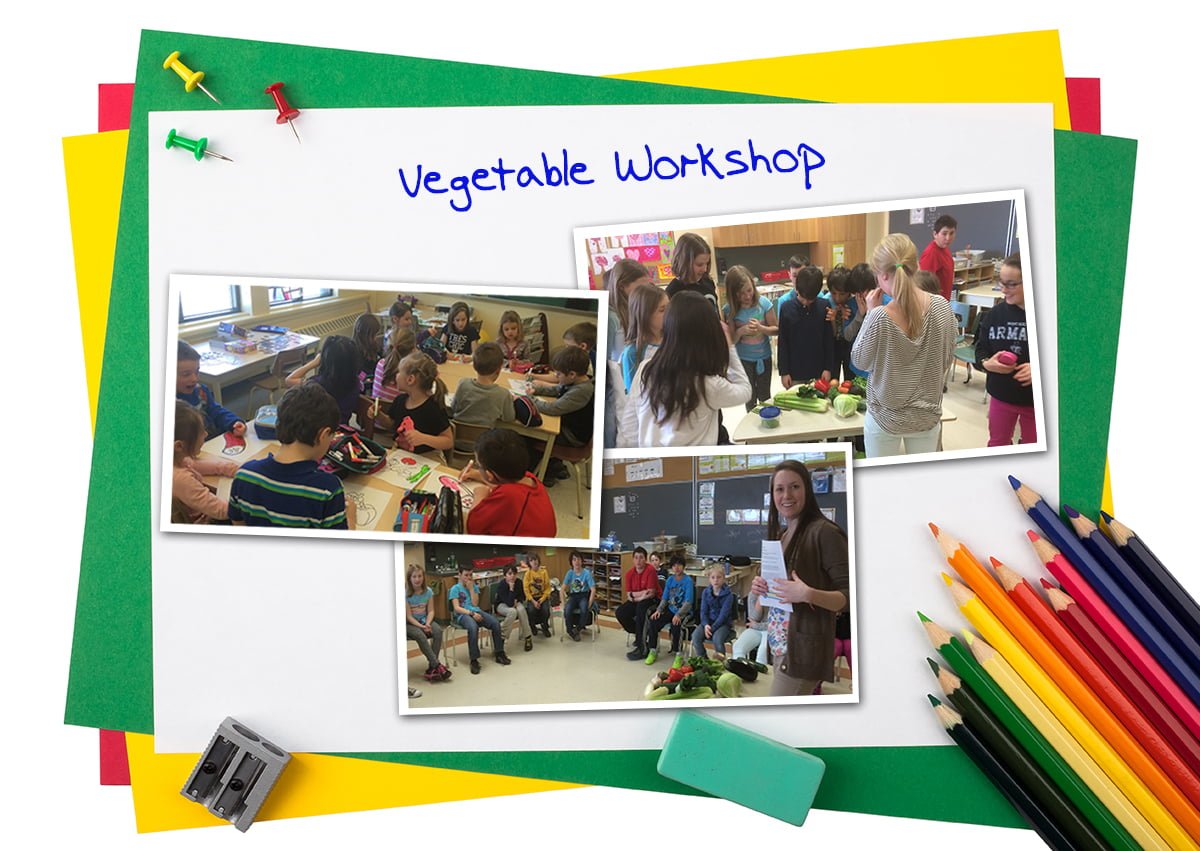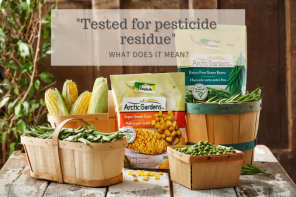Nutrition Month: An activity with inspirational kids
The month of March has just come to an end and we’re turning the page to a month dedicated to heathy nutrition and good eating habits! Every year, Dieticians of Canada presents Nutrition Month to increase public awareness about the importance of healthy eating and giving people the tools to help them make good food choices every day. It’s also the perfect time to talk to kids more seriously about eating and nutrition. This topic should, however, be addressed more often – daily – regardless of what month it is. Young people deserve to know the benefits of a healthy, balanced diet whether it be in March, July or October!
Our pretense to visit young students…
Nutrition Month was an excellent pretense to visit young people at two primary schools and allow them to participate in unforgettable workshops. The tendency is to believe that it’s hard to get kids to eat vegetables, but is it really? Do parents really have to hide veggies in dishes to get kids to eat them?
The goal of our activities: demystify the popular belief that kids aren’t interested in vegetables and they’re reluctant to try anything new!
We believe that the best way to answer the famous question, Do kids like veggies? is to go directly into the field to talk and play with them to see how they react. Aren’t they the best people to answer the question? The workshops that we created allowed us to test their knowledge and their interest in vegetables.
So during Nutrition Month, the team went to two different classes, kindergarten and grade 5. Our goal: have the kids participate in an interactive activity and in this way, get to know and understand them better.
Who are the kids we visited?
The first group we visited was made up of kindergarteners who were 5 or 6 years old. At this age, kids are curious, learn quickly and love to play! In fact, it’s in kindergarten that they first learn about the Canadian food guide and the importance of eating healthy and maintaining a balanced diet.
The second group we visited consisted of students in grade 5 who were about 10 or 11 years old. At this stage in their lives, they love showing off their knowledge and always have something to say on any subject discussed in a group environment. They have been hearing about fruits and vegetables since they started school at about 6 years old, so are aware of their health benefits.
What did we get them to experience?
The activity took place in three main steps. First, we wanted to test their knowledge on nutrition and healthy eating, so we talked about the food guide and the number of servings of fruits and vegetables they should eat every day depending on their age. For the 5 to 6 year olds, 5 servings per day are enough, whereas for the 10 to 11 year olds, 6 servings are what they should eat every day. Surprisingly, they already knew that. Depending on the fruit or vegetable, they learned what real serving sizes are and how to integrate them easily into their daily diet.
The activity continued as a game. The kids first guessed the names of about 30 vegetables – we pulled them out of a bag one at a time – and they answered about 50 original questions about vegetables, including questions on: their colour, taste, benefits to diet, how they grow, are harvested and cooked. They also identified several French expressions that have the names of vegetables in them (to be full of beans, to dangle a carrot, to be as cool as a cucumber…). You can find the complete list of expressions at the end of this article.
Last, we had the kids taste desserts made with vegetables. They were basic, simple ones like banana bread and chocolate cake which are really good alternatives for integrating vegetables into kids’ favourite desserts without being noticeable. The kids had to taste and smell the dessert, then guess the vegetable or vegetables in it. The two recipes that we had the kids to taste were vegetable banana bread prepared with our mixed vegetables, as well as a chocolate mushroom cake from the book Recettes santé pour dents sucrées (in French only) by Annik De Celles. She is the author of several vegetable-based recipe books and owner of the café-shop where her veggie creations are available every day to eat there or take home. She truly advocates healthy eating and the pleasure of eating without ignoring the supply of good nutrients to our bodies. The two desserts we prepared were a HUGE hit with both groups!
Encouraging and surprising reactions!
As soon as we arrived in the classrooms, the kids immediately showed a great interest in our workshop. The fun of learning more about vegetables in a playful way (and the one of not doing maths) created a wonderful ambience! It was a great pleasure for us to deliver our workshops to these kids who had more than a few tricks up their sleeves…
So here’s what touched and surprised us the most during the activity:
– Without exception, all the kids were curious and interested in the subject and the games.
– The little ones in kindergarten could have talked to us for hours about their favourite veggies, healthy meals that their parents cooked, etc.
– The 5 to 6 years olds knew almost all the veggies that we showed them, a little girl in kindergarten even explained what bok choy is!
– A little boy caught us off guard when he told us that a tomato is, in fact, a fruit and not a vegetable since it comes from a flower and has seeds inside.
– Every time we show the group a vegetable, the kids asked us if they could eat a salad because they just LOVE salads.
– We witnessed a young person proudly explain to the other kids in the classroom why her favourite veggie is celery.
– The kids confessed that they learned a lot about the vegetables they didn’t know before. They told us they can’t wait to taste parsnips, beets, eggplants, endives, etc.
– The youngest were the most reluctant to try the vegetable desserts, but they all simply loved them (the proof: everyone asked for seconds).
– They admitted that they didn’t taste the veggies in desserts and that they even liked them. Dessert testing was even punctuated with the loudest “Yummy, it’s delicious!” and “It doesn’t taste like veggies at all!”
– After the activity, the kids asked us to send them the recipes because they had every intention of convincing their parents to bake healthy desserts.
After talking and playing with them for close to an hour about nutrition, they left with smiles on their faces. Not only did the team swell with a little pride, but also made a huge sigh of relief to learn that the popular belief that kids don’t like vegetables is only a myth.
How can I recreate this enthusiasm about vegetables at home?
Sit down and talk to your kids about what they would like to eat. You’ll see – ALL kids have at least two or three favourite veggies that they love most. At least… that’s what they proudly explained to us during the workshops! Don’t wait till next March to talk about it with them. Nutrition Month may be over, but they deserve to eat healthy starting today.
Idiomatic expressions with names of vegetables
- To talk nonsense = to be “full of beans”.
- To be ignorant or uninformed. = to “not know beans”.
- To be worthless = to be “not worth a hill of beans”.
- To tell a secret = to “spill the beans”.
- To encourage someone with an incentive = to “dangle a carrot” before someone.
- A red-haired person = a “carrot top”.
- Someone very self-possessed under pressure = someone “as cool as a cucumber”.
- To make peaceful or reconciliatory overtures = to “pass an olive branch”.
- A stupied person = a “pea-brained” person.
- Something very dense = something being “as thick as pea soup.”
- To be very close with or similar to someone = to be “like two peas in a pod”.
- To experience complication = to be “in a pickle”.
- Someone who spends an excessive amount of time seated watching television or playing video games = a “couch potato”.
- A controversial or difficult issue = a “hot potato”.
- To abandon someone or something = to “drop (someone or something) like a hot potato”.
- Something insignificant = something that is “small potatoes”.
- The youthful period of one’s life = “salad days”.
If you know of other expressions with the names of vegetables in them, let us know so we can add them to our list. Dare to challenge your kids with these riddles or others that you’ve made up to encourage this fascination for veggies!









